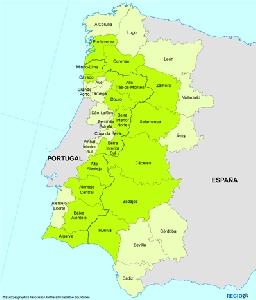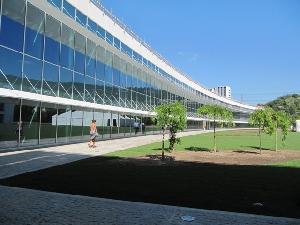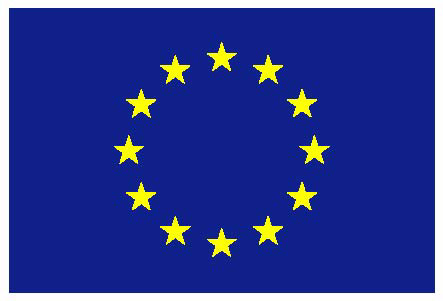Presentation 2007-2013
 |
|||||||||||||||||||||||||||||
| CBC PROGRAMME SPAIN-PORTUGAL 2007-2013 (POCTEP) | |||||||||||||||||||||||||||||
| Programme under the European territorial cooperation objective co-funded by the European Regional Development Fund (ERDF) | |||||||||||||||||||||||||||||
| The European Commission approved on 25 October 2007 a European territorial cooperation Programme for cross-border cooperation between Spain and Portugal for the period 2007-2013 ("Operational Programme for Cross-border Cooperation: Spain – Portugal, 2007-2013").
This programme involves Community support for the 17 NUTS III border areas in both countries, plus 16 NUTS III adjacent areas, within the framework of the European territorial cooperation objective. The total budget for the programme is worth some € 354 million, with Community funding through the European Regional Development Fund (ERDF) amounting to around € 267 million. The programme involves 1 234 km of border between the two countries. The original eligible area for the programme -- the 17 NUTS III areas -- accounts for 23.5% of the Iberian Peninsula, 10.6% of its total population and 9.6% of employment. Area GNP amounts to 7.5% of Iberian GNP. |
|||||||||||||||||||||||||||||
 |
|||||||||||||||||||||||||||||
| 1. Programme purpose and aim | |||||||||||||||||||||||||||||
| The adopted programme is the fourth in a consecutive series of cross-border cooperation programmes between both countries within the framework of the INTERREG Community Initiative for the periods 1990-1993, 1994-1999 and 2000-2006.
The overall objective of the programme is to develop further and broaden the common border areas of both countries within the priorities set by the new European territorial cooperation objective. This marks a substantial shift in the overall programme objectives, away from previous programmes, that is geared chiefly towards improving connectivity and basic infrastructures in the border areas and towards a new approach aimed at improving competitiveness, promoting employment and enhancing socio-economic and institutional integration in the border regions. The trend established through successive programmes has led to a new type of cross border cooperation in the current period that focuses on: • reinforcement of the immaterial component of the interventions; |
|||||||||||||||||||||||||||||
| 2. Expected programme impact | |||||||||||||||||||||||||||||
| The positive results achieved under the previous programmes for the establishment of real cooperation between the partners from both countries will continue under the new orientations, the aim being to develop a more intensive approach to territorial integration and also focus programme interventions on cooperation and the joint management of infrastructures, equipment and services.
A series of indicators, applicable to each of the programme priorities, will make it possible to evaluate the programme’s effects in fields such as its impact on the area’s population, on the partnership and joint management of cooperation projects, on the development of joint spatial planning projects, and on the joint use of infrastructure, equipment and services, etc. |
|||||||||||||||||||||||||||||
| 3. Priorities | |||||||||||||||||||||||||||||
| In accordance with the Lisbon Strategy objectives, the strategic guidelines of the "Operational Programme for Cross-border Cooperation: Spain – Portugal, 2007-2013" are the development of joint economic, social and environmental cross-border activities geared towards sustainable territorial development, chiefly through:
• support and encouragement for entrepreneurial activities, the expansion of SMEs and the development of cross-border tourism, culture and commerce; The "Operational Programme for Cross-border Cooperation: Spain – Portugal, 2007-2013" is structured into the following priorities: |
|||||||||||||||||||||||||||||
| Priority 1: Cooperation and joint management for the improvement of competitiveness and the promotion of employment | |||||||||||||||||||||||||||||
| Specific objectives are: improving regional resources through the promotion of joint innovation and technological development structures between research centres on both sides of the border; promoting joint growth and improving public services through the use of information and communication technologies; promoting the development of local economies and of competitiveness and job creation within them; and promoting and stepping up links between companies and organisations in order to better explore business opportunities within a cross-border context. | |||||||||||||||||||||||||||||
| Priority 2: Cooperation and joint management in environment, cultural heritage and risk prevention | |||||||||||||||||||||||||||||
| This priority, which aims to improve the quality of life for inhabitants in the border area, also reflects the Gothenburg objectives on sustainability. Therefore, it focuses on the coordinated planning and management of environmental infrastructures and services, on the promotion of joint actions to preserve and enhance the environment as well as natural and cultural resources, and on supporting the joint planning and management of human and material resources on both sides of the border regarding risk prevention and interventions in the event of disasters. | |||||||||||||||||||||||||||||
| Priority 3: Cooperation and joint management in spatial planning and accessibility | |||||||||||||||||||||||||||||
| Territorial integration can be achieved through joint spatial and urban-planning processes in the border area. This can be implemented along sustainable lines though the solid planning and coordination of public transport systems on both sides of the border, the establishment of joint cross-border logistics and intermodal transport infrastructures, and the development of joint projects for the shared use of energy resources, in particular renewable energies. | |||||||||||||||||||||||||||||
| Priority 4: Cooperation and joint management for socioeconomic and institutional integration | |||||||||||||||||||||||||||||
| Socio-economic and institutional integration in the programme area can be achieved through the shared use of social, educational, cultural, sports and leisure services in the border regions. The establishment of cooperation mechanisms regarding health and social assistance services will improve the attention and level of coverage provided by such services to border populations. Institutional integration can be enhanced through the establishment of permanent cross-border cooperation networks between local authorities, companies, social organisations and public institutions. | |||||||||||||||||||||||||||||
| Priority 5: Technical assistance for the process of crossborder cooperation | |||||||||||||||||||||||||||||
| There is also provision for technical assistance in order to implement the programme. Financial support is available to cover administration, monitoring, evaluation and control. | |||||||||||||||||||||||||||||
| 4. Managing Authority | |||||||||||||||||||||||||||||
| Ministerio de Hacienda y Administraciones Públicas Dirección General de Fondos Comunitarios |
|||||||||||||||||||||||||||||
| Director General de Fondos Comunitarios José María Piñero Campos Paseo de la Castellana 162 – Planta 20 Tel.: 00 34 91 583 52 68 |
|||||||||||||||||||||||||||||
| Web DGFC | |||||||||||||||||||||||||||||
| 5. Financial and Technical information | |||||||||||||||||||||||||||||
|
|||||||||||||||||||||||||||||
|
|||||||||||||||||||||||||||||
| WEB INFOREGIO | |||||||||||||||||||||||||||||
| INL project co-financed by Cross-border Cooperation Programme Spain Portugal 2007-2013 |
| The construction of the International Iberian Nanotechnology Laboratory (INL) is co-financed from the ERDF (European Regional Development Fund) in 30 million euros.
By the end of January 2009, the application submitted by the INL to the Cross-Border Cooperation Programme Spain Portugal 2007-2013 was approved be the Monitoring Committee of the Programme. The overall objective is to build a centre of excellence in applied nanotechnology research, with a positive impact in the region’s competitiveness, promotion of qualified employment, new companies, but also in the development of the relational model Administration/INL/Company/University. The project submitted by INL includes the construction of competitive scientific infra-structures, with the objective to attract top researchers in the field of nanotechnology. The installation of the facilities in the North of Portugal, more precisely in Braga, will also favour the development of methodologies that enhance a ecosystem of spin offs, as well as the integration of the INL in Networks of knowledge. At the end of this project, the region shall benefit from competitive technological infrastructures, on an international level, increasing the regional competitiveness of companies, universities and technological centres. The local environment for spin-offs and technological centres to emerge, as well as the conditions for their survival, shall also improve. |
| WEB INL PROJECT |
| More information about INL project |
 |
 |
 |
| In this article, provided in english only, of the portuguese Professor Eduardo Medeiros, from the Lisbon University, specialist on territorial cooperation, the main goal is to realize if the INTERREG-A Community Initiative, launched in July 1990 to support the CBC in the EU territory has been getting the correspondent financial support, when compared with other EU regional Cohesion Policy instruments. |
|
|
Newsletter
Seleccione abajo para suscribirse
POCTEP Contacts
Contacts 2014-2020 | Contacts 2007-2013
- programa@poctep.eu
- (+34) 924 20 59 58
- Edificio Montevideo | C/ Ángel Quintanilla Ulla n°1, portal 3 | Entreplanta B, 06011, Badajoz (Spain)




